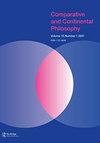Ideas in Finisterre
IF 0.3
0 PHILOSOPHY
引用次数: 0
Abstract
In Roman times, Finisterre was considered the place where the world ended (in Latin, it means literally “the end of the world”). It is actually a cape on the west coast of Galicia, Spain, and no one would nowadays believe it to be the end of anything. We might now believe that Argentina, in the southern extreme of America, is the current location of Finisterre. The six essays that compose this special issue of Continental and Comparative Philosophy, all conceived and produced in Argentina, would thus be a sample of the philosophy of Finisterre. But what does this mean? What does it mean, in philosophy, to be at the end of the world? It is clearly not a question of geographic location. Even if boundaries are essentially variable, in constant becoming, the issue is not one of empirical cartography. What is it then? First of all, at the end of the philosophical world, we work and think in a location where the access to journals, books, courses, lectures, and conferences that take place in the supposed center of the world are scarce, problematic, and expensive. Secondly, we speak a minor philosophical language (Spanish) and are strangers in the supposed lingua franca of our discipline (English); we speak it precariously, and we fail to express our ideas with the rigor that we are used to in our native tongue. In the third place, most of the authors that we study (in our undergraduate studies, for our thesis, our senior research) do not belong in our land, but in Europe (with rare exceptions). It does not mean that there are no great philosophers in Argentina, or Latin America in general. There are. But, once again, many of them sink their thought deeply in European authors, intertwining with them as roots; their work is often based on those thinkers and cannot be followed without some knowledge of their production. And the farther they move away from the shores of the mainland, the less they will be recognized as “philosophers” (philosophy being defined mostly by attachment to the canon). These three facts (conditions of production, minor use of the English language, and research mainly focused on European authors) are true for the nine authors that share the pages of this special issue of Continental and Comparative Philosophy Journal, as well as for me as guest editor. We all share a formation that has focused notably on the Greek, German, and French traditions. We have written our doctoral dissertations and carry on our research in close relation to German Idealism, Phenomenology, or Post-structuralism. We believe, however, that there is an Argentinian philosophy (as a part of a Latin American character), which is both a fact and a task, and that our work must belong to that tradition. We have no certainty or agreement about how菲尼斯特雷的想法
在罗马时代,菲尼斯特雷被认为是世界结束的地方(在拉丁语中,它的字面意思是“世界的尽头”)。它实际上是西班牙加利西亚西海岸的一个海角,现在没有人会相信它是任何事情的终结。我们现在可能会认为,位于美洲最南端的阿根廷是菲尼斯特雷的所在地。《大陆与比较哲学》特刊的六篇论文都是在阿根廷构思和制作的,因此,它们将成为菲尼斯特雷哲学的一个样本。但这意味着什么呢?在哲学上,世界末日意味着什么?这显然不是地理位置的问题。即使边界在本质上是可变的,在不断变化中,这个问题也不是经验制图的问题。那是什么呢?首先,在哲学世界的尽头,我们工作和思考的地方,期刊、书籍、课程、讲座和会议在所谓的世界中心是稀缺的、有问题的和昂贵的。其次,我们讲的是一门次要的哲学语言(西班牙语),而我们的学科所谓的通用语(英语)则是陌生人;我们不稳定地说英语,我们不能像用母语那样严谨地表达我们的想法。第三,我们研究的大多数作者(在我们的本科学习中,在我们的论文中,在我们的高级研究中)都不属于我们的国家,而是在欧洲(除了极少数例外)。这并不意味着阿根廷或整个拉丁美洲没有伟大的哲学家。有。但是,再一次,他们中的许多人将他们的思想深深植根于欧洲作家,与他们交织在一起作为根;他们的作品往往以这些思想家为基础,如果不了解他们的作品,就无法理解。他们离大陆的海岸越远,他们就越不会被认为是“哲学家”(哲学的定义主要是依附于经典)。这三个事实(生产条件,少量使用英语,研究主要集中在欧洲作家身上)对本期《大陆与比较哲学》特刊的九位作者和我这个客座编辑来说都是正确的。我们都有一个特别注重希腊、德国和法国传统的组织。我们的博士论文和研究都与德国唯心主义、现象学或后结构主义密切相关。然而,我们认为有一种阿根廷哲学(作为拉丁美洲特色的一部分),它既是事实也是任务,我们的工作必须属于这一传统。我们对如何做到这一点没有确定或一致的看法
本文章由计算机程序翻译,如有差异,请以英文原文为准。
求助全文
约1分钟内获得全文
求助全文

 求助内容:
求助内容: 应助结果提醒方式:
应助结果提醒方式:


